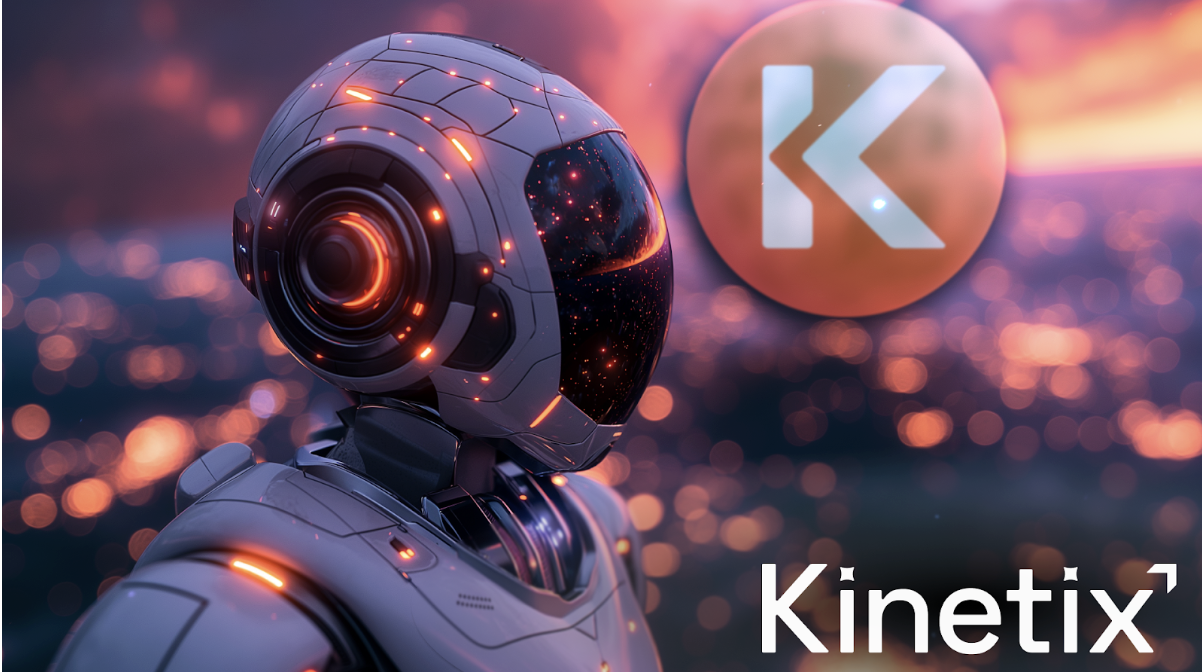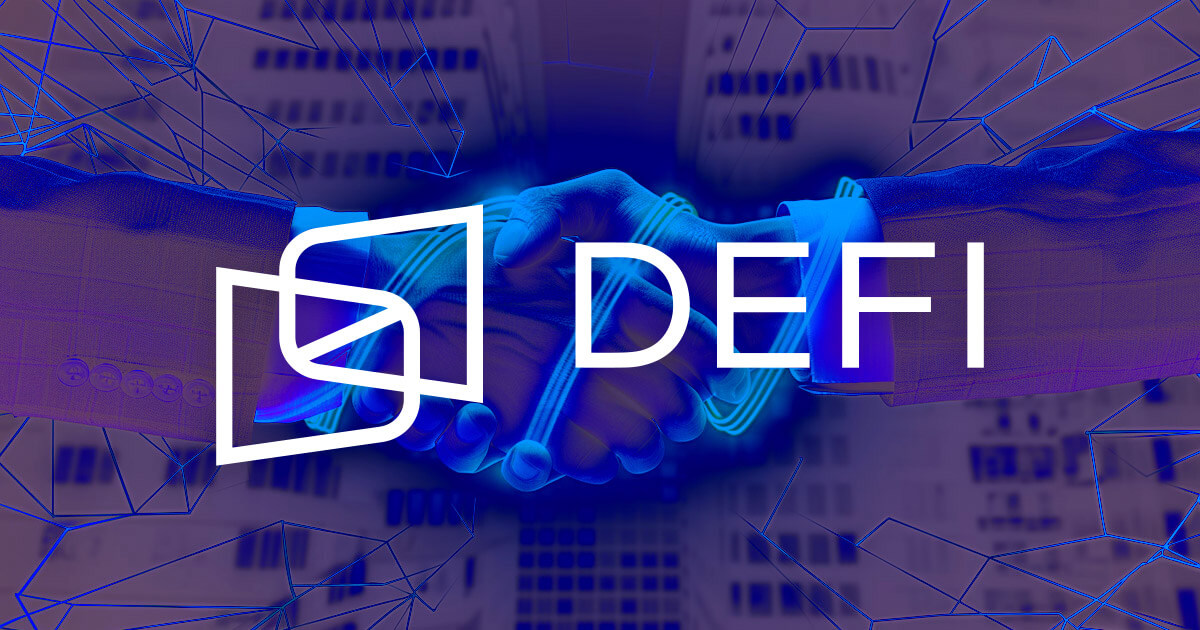DeFi
Navigating the Evolution of DeFi: Kinetix’s AI-Driven Solution

The DeFi (Decentralized Finance) sector has seen significant growth over the past few years. While traditional financial systems struggle with inefficiencies, DeFi offers a decentralized alternative that promises greater transparency, security, and inclusiveness.
Yet despite its potential, the DeFi space is not without its challenges. Complex interfaces, steep learning curves, and the need for constant vigilance in a rapidly changing market deter many potential users.²
The Growing Difficulties of DeFi
The decentralized nature of DeFi is both its strength and its Achilles heel. On the one hand, it cuts out middlemen, thereby reducing costs and increasing accessibility. On the other hand, it requires users to navigate a maze of protocols, tokens and trading strategies.
For newcomers, this can be intimidating. Even experienced traders often find themselves overwhelmed by the volume of information and the speed at which the market moves. This complexity creates a barrier to entry, limiting the adoption of DeFi technologies.
Kinetix Overview
Enter Kinetix, a platform that aims to simplify and improve the DeFi experience through the integration of advanced AI technologies. Launched just a year ago, Kinetix has quickly become a significant player in the DeFi space, boasting impressive stats and a vibrant community.
Kinetix’s numbers speak for themselves: the platform supports Perps v2, including forex and commodities, and Perps v1 with up to 50x leverage. It attracted 11,764 unique users and generated total volume of over $1.5 billion. The platform has generated $440,000 in fees and has a total value locked (TVL) of $21.7 million. With a presence on several blockchain networks like Kava and Cosmos, Kinetix is well-positioned to address the challenges of DeFi.
The Power of AI in DeFi
Kinetix’s recent announcement in early May introduced a suite of AI features designed to give traders an edge. These innovations are not just about adding new tools; they represent a shift towards more accessible and user-friendly DeFi.
- AI-powered news feed: Staying informed in the DeFi world is crucial. Kinetix’s AI-powered news feed keeps users informed of market events in real time. This feature consolidates news from various sources, providing a comprehensive overview that helps users quickly make informed decisions.
- AI Companion: Leveraging Large Language Models (LLM), this companion can respond to user queries by consolidating information from public documents. Beyond simply answering questions, it can perform simple actions such as swaps and perpetual transactions based on user prompts. This simplifies the trading process, making it more intuitive and less intimidating for users.
- High performance trading bots: Trading robots are a staple of the DeFi world, but Kinetix’s robots have a special feature. These high-performance bots are designed to optimize trade execution, protect against miner extractable value (MEV), and guarantee the best prices. By automating complex trading strategies, these robots ensure that users can maximize their returns while minimizing risks.
- Strategy Center: This platform allows users to assign robots to execute various trading strategies with just one click. From arbitrage trades to delta-neutral yield plays and alpha-maximizing liquidity provider (LP) strategies, the Strategy Hub simplifies complex trading tactics, making them accessible to all users.
Recent DEVELOPMENTS
Kinetix has not rested on its laurels. The platform continues to evolve, with several key updates and developments:
- $KAI Airdrop: The $KAI token, at the heart of the Kinetix ecosystem, is intended for airdrop, rewarding users from different segments. This initiative aims to encourage active participation and expand the platform’s user base.
- Platform integrations: Kinetix has integrated with OpenOcean, a leading DeFi aggregator. This integration allows OpenOcean users to access Kinetix’s DEX V3, Perps V2 and multi-asset liquidity, improving the reach and functionality of the platform.
- Registration on Gate.io: The $KAI token will be listed on Gate.io on June 20, 2024. This listing is expected to increase the visibility and liquidity of the token, attracting more traders to the platform.
- Strategic partnerships: Kinetix has partnered with various industry-leading protocols, including Pyth, Abracadabra, Hover, MetaVault, and Steer Finance. These partnerships aim to strengthen the capabilities of the platform and expand its ecosystem.
- Kinetix V3 DEX and ICHI integration: Kinetix has integrated ICHI’s liquidity management technology into its DEX V3, improving liquidity and trading efficiency. This integration is part of Kinetix’s ongoing efforts to improve the performance and user experience of its platform.
Kinetix IDO: Fueling Future Growth
The Initial DEX Offering (IDO) of Kinetix’s $KAI token was a significant event for the platform.
Here is a detailed overview of the IDO process and its implications:
Key dates:
- Whitelisting: June 4 at 10 a.m. UTC – June 11 at 10 a.m. UTC
- Whitelist Winner Announcement: June 16-17, 10 a.m. UTC
- Whitelisting: June 17, 10 a.m. UTC – June 19, 10 a.m. UTC
- FCFS sale: June 19, 10 a.m. UTC – June 20, 10 a.m. UTC
IDO Details –
- Introductory price: 0.015 USDC per $KAI
- Total amount: 400,000 USDC
- Total issued: $26,666,666KAI
- Total winning tickets: 1,600
- Redemption amount: 250 USDC per ticket
- Total number of participants: 119,623
Interested users can visit the IDO at Eclypse website. The $KAI token serves as a key to the entire Kinetix ecosystem, powering the DeFi hub exclusively designed for the Kava ecosystem. The IDO was designed to effectively reward Kinetix users and expand the platform’s user base.
The future of AI-powered DeFi
Kinetix’s vision extends beyond its current achievements. The platform is committed to leading the next wave of DeFi innovation, integrating AI to make decentralized finance more accessible and efficient. The upcoming launch and airdrop of the $KAI token is part of this vision, aiming to encourage participation and reward users.
As AI continues to shape the tech industry, Kinetix’s approach could serve as a model for future DeFi developments. By making the user experience more intuitive and lowering the barriers to entry, Kinetix is poised to attract a wider audience and drive the next phase of DeFi growth.
Kinetix is at the forefront of a new era in DeFi, leveraging AI to address the challenges and complexities of decentralized finance. By simplifying the user experience and providing advanced trading tools, Kinetix makes DeFi more accessible and efficient. As the platform continues to evolve and grow, it is set to play a crucial role in shaping the future of decentralized finance. The integration of AI into DeFi is not just a trend but a transformative change that could redefine the way we interact with financial systems, making them more inclusive, transparent and user-friendly.
Publications viewed: 76
DeFi
Pump.Fun is revolutionizing the Ethereum blockchain in terms of daily revenue

The memecoin launchpad saw the largest daily revenue in all of DeFi over the past 24 hours.
Memecoin launchpad Pump.Fun has recorded the highest gross revenue in all of decentralized finance (DeFi) in the last 24 hours, surpassing even Ethereum.
The platform has raised $867,429 in the past 24 hours, compared to $844,276 for Ethereum, according to DeFiLlama. Solana-based Telegram trading bot Trojan was the third-highest revenue generator of the day, as memecoin infrastructure continues to dominate in DeFi.
Pump.Fun generates $315 million in annualized revenue according to DeFiLlama, and has averaged $906,160 per day over the past week.
Income Ranking – Source: DeFiLlama
The memecoin frenzy of the past few months is behind Pump.fun’s dominance. Solana-based memecoins have been the main drug of choice for on-chain degenerates.
The app allows non-technical users to launch their own tokens in minutes. Users can spend as little as $2 to launch their token and are not required to provide liquidity up front. Pump.Fun allows new tokens to trade along a bonding curve until they reach a set market cap of around $75,000, after which the bonding curve will then be burned on Raydium to create a safe liquidity pool.
Pump.Fun generates revenue through accrued fees. The platform charges a 1% fee on transactions that take place on the platform. Once a token is bonded and burned on Raydium, Pump.fun is no longer able to charge the 1% fee.
Ethereum is the blockchain of the second-largest cryptocurrency, Ether, with a market cap of $395 billion. It powers hundreds of applications and thousands of digital assets, and backs over $60 billion in value in smart contracts.
Ethereum generates revenue when users pay fees, called gas and denominated in ETH, to execute transactions and smart contracts.
DeFi
DeFi technologies will improve trading desk with zero-knowledge proofs

DeFi Technologies, a Canadian company financial technology companyis set to enhance its trading infrastructure through a new partnership with Zero Computing, according to a July 30 statement shared with CryptoSlate.
The collaboration aims to integrate zero-knowledge proof tools to boost operations on the Solana And Ethereum blockchains by optimizing its ability to identify and execute arbitrage opportunities.
Additionally, it will improve the performance of its DeFi Alpha trading desk by enhancing its use of ZK-enabled maximum extractable value (MEV Strategies).
Zero knowledge Proof of concept (ZKP) technology provides an additional layer of encryption to ensure transaction confidentiality and has recently been widely adopted in cryptographic applications.
Optimization of trading strategies
DeFi Technologies plans to use these tools to refine DeFi Alpha’s ability to spot low-risk arbitrage opportunities. The trading desk has already generated nearly $100 million in revenue this year, and this new partnership is expected to further enhance its algorithmic strategies and market analysis capabilities.
Zero Computing technology will integrate ZKP’s advanced features into DeFi Alpha’s infrastructure. This upgrade will streamline trading processes, improve transaction privacy, and increase operational efficiency.
According to DeFi Technologies, these improvements will increase the security and sophistication of DeFi Alpha’s trading strategies.
The collaboration will also advance commercial approaches for ZK-enabled MEVs, a new concept in Motor vehicles which focuses on maximizing value through transaction fees and arbitrage opportunities within block production.
Additionally, DeFi Technologies plans to leverage Zero Computing technology to develop new financial products, such as zero-knowledge index exchange-traded products (ETPs).
Olivier Roussy Newton, CEO of DeFi Technologies, said:
“By integrating their cutting-edge zero-knowledge technology, we not only improve the efficiency and privacy of our transactions, but we also pave the way for innovative trading strategies.”
Extending Verifiable Computing to Solana
According to the release, Zero Computing has created a versatile, chain-agnostic platform for generating zero-knowledge proofs. The platform currently supports Ethereum and Solana, and the company plans to expand compatibility with other blockchains in the future.
The company added that it is at the forefront of introducing verifiable computation to the Solana blockchain, enabling complex computations to be executed off-chain with on-chain verification. This development represents a significant step in the expansion of ZKPs across various blockchain ecosystems.
Mentioned in this article
Latest Alpha Market Report
DeFi
Elastos’ BeL2 Secures Starknet Grant to Advance Native Bitcoin Lending and DeFi Solutions

Singapore, Asia, July 29, 2024, Chainwire
- Elastos BeL2 to Partner with StarkWare to Integrate Starknet’s ZKPs and Cairo Programming Language with BeL2 for Native DeFi Applications
- Starknet integration allows BeL2 to provide smart contracts and dapps without moving Bitcoin assets off the mainnet
- Starknet Exchange Validates the Strength of BeL2’s Innovation and Leadership in the Native Bitcoin Ecosystem
Elastos BeL2 (Bitcoin Elastos Layer2) has secured a $25,000 grant from Starknet, a technology leader in the field of zero-knowledge proofs (ZKPs). This significant approval highlights the Elastos BeL2 infrastructure and its critical role in advancing Bitcoin-native DeFi, particularly Bitcoin-native lending. By integrating Starknet’s ZKPs and the Cairo programming language, Elastos’ BeL2 will enhance its ability to deliver smart contracts and decentralized applications (dapps) without moving Bitcoin (BTC) assets off the mainnet. This strategic partnership with Starknet demonstrates the growing acceptance and maturity of the BeL2 infrastructure, reinforcing Elastos’ commitment to market leadership in the evolving Bitcoin DeFi market.
Starknet, developed by StarkWare, is known for its advancements in ZKP technology, which improves the privacy and security of blockchain transactions. ZKPs allow one party to prove to another that a statement is true without revealing any information beyond the validity of the statement itself. This technology is fundamental to the evolution of blockchain networks, which will improve BeL2’s ability to integrate complex smart contracts while preserving the integrity and security of Bitcoin.
“We are thrilled to receive this grant from Starknet and announce our partnership to build tighter integrations with its ZKP technology and the Cairo programming language,” said Sasha Mitchell, Head of Bitcoin Layer 2 at Elastos. “This is a major milestone for BeL2 and a true recognition of the maturity and capabilities of our core technology. This support will allow us to further develop our innovation in native Bitcoin lending as we look to capitalize on the growing acceptance of Bitcoin as a viable alternative financial system.”
A closer integration with Cairo will allow BeL2 to leverage this powerful programming language to enhance Bitcoin’s capabilities and deliver secure, efficient, and scalable decentralized finance (DeFi) applications. Specifically, the relationship with Cairo reinforces BeL2’s core technical innovations, including:
- ZKPs ensure secure and private verification of transactions
- Decentralized Arbitrage Using Collateralized Nodes to Supervise and Enforce Fairness in Native Bitcoin DeFi
- BTC Oracle (NYSE:) facilitates cross-chain interactions where information, not assets, is exchanged while Bitcoin remains on the main infrastructure
BeL2’s vision goes beyond technical innovation and aims to innovate by creating a new financial system. The goal is to build a Bitcoin-backed Bretton Woods system, address global debt crises, and strengthen Bitcoin’s role as a global hard currency. This new system will be anchored in the integrity and security of Bitcoin, providing a stable foundation for decentralized financial applications.
As integration with Starknet and the Cairo programming language continues, BeL2 will deliver further advancements in smart contract capabilities, decentralized arbitration, and innovative financial products. At Token 2049, BeL2 will showcase further innovations in its core technologies, including arbitrators, that will underscore Elastos’ vision for a fairer decentralized financial system rooted in Bitcoin.
About Elastos
Elastos is a public blockchain project that integrates blockchain technology with a suite of redesigned platform components to produce a modern Internet infrastructure that provides intrinsic privacy and ownership protection for digital assets. The mission is to create open source services that are accessible to the world, so developers can create an Internet where individuals own and control their data.
The Elastos SmartWeb platform enables organizations to recalibrate how the Internet operates to better control their own data.
https://www.linkedin.com/company/elastosinfo/
ContactPublic Relations ManagerRoger DarashahElastosroger.darashah@elastoselavation.org
DeFi
Compound Agrees to Distribute 30% of Reserves to COMP Shareholders to End Alleged Attack on Its Governance

Compound will introduce the staking program in exchange for Humpy, a notorious whale accused of launching a governance attack on the protocol, negating a recently adopted governance proposal.
Compound is launching a new staking program for COMP holders as a compromise with Humpy, a notorious DeFi whale accused of launching a governance attack against the veteran DeFi protocol.
On July 29, Bryan Colligan, head of business development at Compound, published a governance proposal outlining plans for a new compound participation product that would pay 30% of the project’s current and future reserves to COMP participants.
Colligan noted that the program was requested by Humpy in exchange for his agreement Proposition 289 — which sought to invest 499,000 COMP worth approximately $24 million into a DeFi vault controlled by Humpy, and which appears to have been forced by Humpy and his associates over the weekend.
“We propose the following staking product that meets Humpy’s stated interests as a recent new delegate and holder of COMP in exchange for the repeal of Proposition 289 due to the governance risks it poses to the protocol,” Colligan said. “The Compound Growth Program…will execute the above commitments, given the immediate repeal of Proposition 289.”
Colligan added that the proposal would expire at 11:59 p.m. EST on July 29. Had Humpy not rescinded Proposition 289, Compound would move forward with it. Proposition 290 — block Humpy using the Compound team’s multi-sig to deploy a new governor contract removing the delegate’s governance power behind Proposition 289.
Hunchback tweeted that Proposition 289 had been repealed a few hours ago. “Glad to have brought Compound Finance back into the spotlight,” they said. added. “StakedComp… finally becomes a yield-generating asset!
Markets reacted favorably to the resolution, with the price of COMP increasing by 6.2% over the past 24 hours, according to CoinGecko.
Attack on governance
Proposition 289 proposed investing 499,000 COMP from the Compound treasury into goldCOMP, a yield-generating vault of the Humpy-linked Golden Boys team.
The proposal passed with nearly 52 percent of the vote on July 28, despite two previous iterations of the proposal being defeated by strong opposition. Can And JulyThe proposals notably asked for only 92,000 COMP, with security researchers warning that any deposit of tokens into the goldCOMP vault would cede their governance power.
In May, Michael Lewellen of Web3 security firm OpenZeppelin, note The first proposal was submitted by a new governance delegate who was suddenly awarded 228,000 COMP by five wallets that got their tokens from the Bybit exchange. Combined with his own tokens, the delegate got 325,333 COMP, which is over 81% of the 400,000 tokens required for a governance proposal to reach quorum.
“We have been alerting the community to the risk that these delegates could support a potential attack on governance,” Lewellen said. “The timing of the new proposal and these recent delegations are suspect.”
Read more: Compound community accuses famous whale of attacking engineering governance
-

 Videos4 weeks ago
Videos4 weeks agoAbsolutely massive: the next higher Bitcoin leg will shatter all expectations – Tom Lee
-

 News12 months ago
News12 months agoVolta Finance Limited – Director/PDMR Shareholding
-

 News12 months ago
News12 months agoModiv Industrial to release Q2 2024 financial results on August 6
-

 News12 months ago
News12 months agoApple to report third-quarter earnings as Wall Street eyes China sales
-

 News12 months ago
News12 months agoNumber of Americans filing for unemployment benefits hits highest level in a year
-

 News1 year ago
News1 year agoInventiva reports 2024 First Quarter Financial Information¹ and provides a corporate update
-

 News1 year ago
News1 year agoLeeds hospitals trust says finances are “critical” amid £110m deficit
-

 DeFi1 year ago
DeFi1 year ago🏴☠️ Pump.Fun operated by Insider Exploit
-

 Markets1 year ago
Markets1 year agoWhale Investments in Bitcoin Hit $100 Billion in 2024, Fueling Insane Investor Optimism ⋆ ZyCrypto
-

 Videos1 year ago
Videos1 year ago$1,000,000 worth of BTC in 2025! Get ready for an UNPRECEDENTED PRICE EXPLOSION – Jack Mallers
-

 Videos1 year ago
Videos1 year agoABSOLUTELY HUGE: Bitcoin is poised for unabated exponential growth – Mark Yusko and Willy Woo
-

 Tech1 year ago
Tech1 year agoBlockDAG ⭐⭐⭐⭐⭐ Review: Is It the Next Big Thing in Cryptocurrency? 5 questions answered





